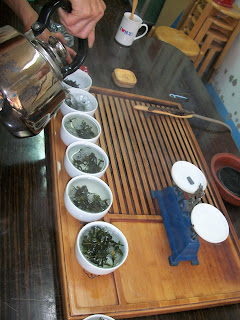
Ever since I started to visit Pinglin for Baozhong tea, I've continued to have a special love for that place. I simply love the landscape there. It's so green and full of life, which makes me feel energized when I'm there. Usually when I talk about loving a place, a lot of my good memories include the people there that I know.
I was introduced to Baozhong Farmer Chen and his wife back in 2005. They graciously received and shared tea with us, as well as taking us to visit his tea farm. I still remember that day so well. At the time, I had not been back to Taiwan in a long time, so it was great to be in a place where I felt familiar with the food, customs, weather and the people. It was also a different trip that time. I went back with a new interest: tea.
That day was a usual humid and warm (28C) day for Taiwan. I greedily took in the air and was so excited to be in the hot climate. As we got out of his van, Farmer Chen led us to a winding dirt road that slowly crept up the hill. After 5 minutes of walking, he suddenly stopped and said, " Ah! I love this weather! It makes me sweat!"
After knowing him for over five years now, Farmer Chen strikes me as a very straight forward person. He is confident about what he knows and he won't pretend to know things that he doesn't. Once I asked him about his views on other teas. He told me he didn't know much about them, since he only makes Baozhong tea ( In recent years, he starts to make some Black tea and Oriental Beauty). His father was also a Baozhong farmer, so he learned the skills of tea making through his father and eventually took over the family business.
One time I was asking him about his aged teas and he brought out the aged Buddha Hand that I liked a lot (I am glad that some of you liked that tea a lot, too!) I asked him how old that Buddha Hand was and Farmer Chen told me "about 10 to 20 years." I burst out laughing so hard and said, " Mr. Chen, do you realize what you just said spans 10 years?" He looked at me with a smile and looked at his wife to see if she had an answer. He said, " To be honest, how can I keep track of those things?" We continued to drink tea and later I stood up to look around. I opened the container where they stored the aged Buddha Hand and found a note on the lid stating how old the tea was, with a date of their last roast as well. I said, "Mr. Chen! The tea is 18 years old" and showed him the lid. He smiled and said, "You see, I was right. 10 to 20 years old!"

Farmer Chen and his wife work on the farm together. Mr. Chen processes all of his teas himself and Mrs Chen helps. They own a retail shop on the main street in Pinglin so she spends a lot of time there, too. They have a son and he is in Taipei so that he can have "a better life" than farming. Tea making is very hard work. I asked Chen once if his son is interested in growing tea and he said no. I asked what is going to happen when he no longer can farm. He said he doesn't know. "Can you adopt me?" I asked. He answered with a smile, "Do you know how hard this is, Miss Tai?" "I can try. I am a very tough person." "I don't think you can do it." Mr. Chen replied (In the past, I have asked some farmers to adopt me so that I can learn more about tea, but I've always been rejected. How frustrating!)
We have carried Farmer's Choice Baozhong from Mr. Chen for five years. Each year, we have tried to find a Baozhong that has a heavier body than the competition style Baozhong, which is known for its strong floral notes. After I tried teas with Mr. and Mrs Chen last year and made my purchase decisions, I told Farmer Chen, "Mr. Chen, you are the farmer. You should be the one to choose 'Farmer's Choice Baozhong' for us." He stood up and came back with some tea leaves in his hand. I tasted a sip of that tea and looked at him with my eyes wide open, "Are you serious? This is not even Qingxin Oolong!" (Yes, I sounded snobby. What an impolite way to act towards a respected tea farmer!) He said, "Miss Tai, I am a farmer. I work on the fields all day. I don't have time to drink tea Gongfu style, so something with a big flavor is what I would drink as a farmer."
It is always a delight to spend some time with the Chen family. I am looking forward to many more years of my tea relationship with them.




















































